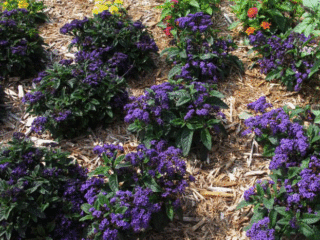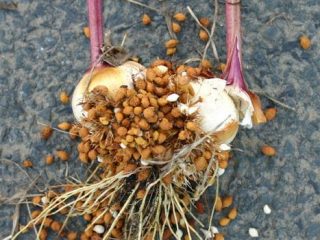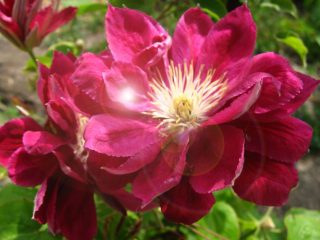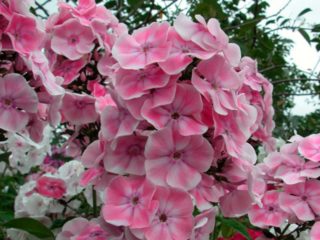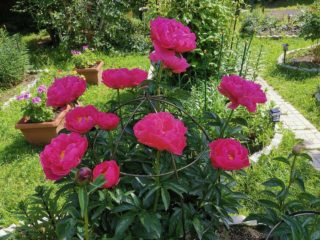Content
Heliotrope Marine is a perennial tree-like culture that is distinguished by its decorative qualities and is able to decorate any garden plot, flower bed, mixborder or flower garden. The plant has an enchanting vanilla aroma and therapeutic potential, therefore it is used in cosmetology and pharmaceuticals. Growing Marin's heliotrope from seeds is a rather difficult task that requires some theoretical training and practical skills.
Description of heliotrope Marine
The homeland of the heliotrope is South America. In a tropical and subtropical climate, the flower can delight its owners for many years. However, heliotrope is not able to survive wintering in the temperate continental climatic zone, therefore in Russia the culture is grown mainly as an annual.
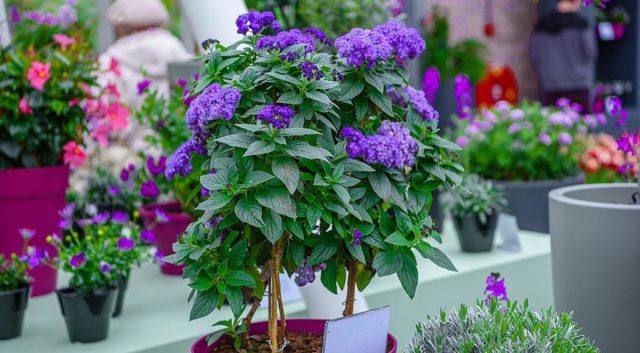
A distinctive feature of the Marine variety is a fast development rate that allows the plant to bloom in the first year after sowing.
The heliotrope of the Peruvian Marin has a tree-like shape and reaches 50 cm in height. In warm climates, the plant can grow up to 65-70 cm. The leaves are alternate with a wrinkled surface. Heliotrope Marine is distinguished by lush buds that exude a subtle vanilla aroma. The culture is very unpretentious, but many gardeners have difficulties in propagating by seed.
Flowering features
Marin's heliotrope flowers are corymbose and include many buds. Reach 20 cm in diameter. They have a bright violet-blue color. Blossoming of heliotrope Marin begins a few months after planting the seeds. The first buds appear in June. Flowering is quite long and ends with the onset of frost.
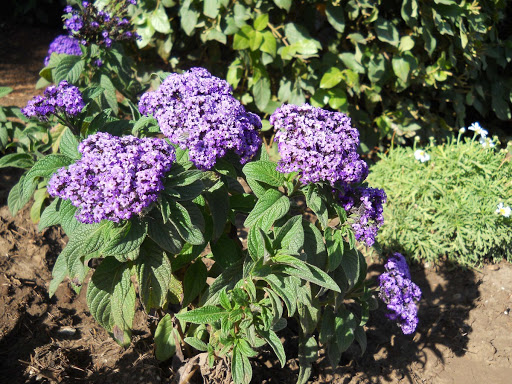
The Marine variety is considered light-loving, but the scorching sun can cause the buds to burn out.
Application in landscape design
Heliotrope Marine (pictured) is suitable for growing both in flower beds and at home. Optimal places for a flower are loggias, balconies and terraces. Decorative heliotrope Marine can be used to form flower beds and mixborders. Since indoor conditions are considered to be preferable for the culture, it is much more common on window sills and balconies than in garden plots.
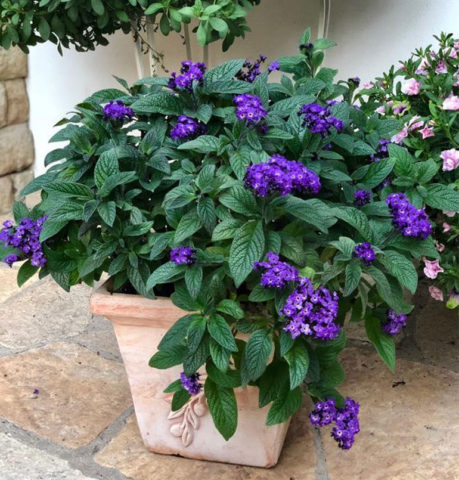
The pots should be placed on the sunny side, as Marin's Heliotrope prefers an abundance of light and warmth.
Breeding features
Previously, the culture was propagated mainly by cuttings. With the development of breeding, many new varieties have emerged that multiply by seeds.
In the case of propagation by cuttings, the mother flower is carefully dug out of the soil along with a lump of earth, placed in a suitable container and left for the winter in a warm room. Cuttings of Marin's heliotrope are prepared in mid-February. Each shoot should have three to four internodes. The abundance of foliage weakens the cutting.
Planting and care rules
Heliotrope Marine prefers sunny places with loose soil saturated with organic matter and high water permeability. The decorativeness of the seedlings depends on the correctly chosen territory and competent care.
Timing
It is possible to plant seedlings of Marin heliotrope in open ground only after the frost stops before the beginning of the flowering period. Shoots need preliminary preparation in the form of hardening, which begins in late April.
Selection of containers and soil preparation
To prepare the soil mixture, peat, sand and humus are taken in equal proportions. You can use ready-made substrates designed for growing flower seedlings. Before planting seeds, it is recommended to disinfect the soil (for this, a pink solution of potassium permanganate is used). The soil for growing at home should be 2/3 of peat.
Sowing seeds for seedlings
The seeds are scattered over the surface of the soil, after which they are pressed, but they are not covered with anything. Some gardeners recommend sprinkling the seeds with a 3mm layer of soil. Marin's Heliotrope seeds germinate within three weeks. The boxes should be placed in a warm place with good lighting. After 35 days, the plants must be distributed in separate containers, which are placed in a well-ventilated area.

Heliotrope seeds obtained from their garden are characterized by low germination, therefore it is recommended to buy seed material only in stores.
Seedling care
Seedlings should be kept in a room with a temperature of +21 to +23 ° C, providing it with periodic watering. Approximately two weeks after the emergence of seedlings, seedlings need feeding with one of the complex preparations. When the seedlings acquire two real leaves, they are seated in separate pots, the depth of which is at least 9 cm. At the end of April, they begin to harden the plants, taking the pots out into the fresh air, gradually extending the time they spend outside.
Transfer to the ground
The hardened seedlings of Marin heliotrope are planted in open ground after the threat of recurrent frosts has passed. Experienced gardeners recommend transplanting from the end of May to the first half of June. The soil needs preliminary loosening, followed by the addition of organic fertilizers. In the case of heavy soil, sand is added, and a little clay is added to the sandy soil.
Growing heliotrope Marine
Heliotrope Marine is suitable for outdoor cultivation. However, due to the intolerance of negative temperatures, it must be removed indoors for the winter.
Watering and feeding
An adult plant does not need frequent watering. Water must be poured at the root only after a dry crust has formed around the flower. The drought period negatively affects the decorative qualities, therefore, in hot and dry weather, the Marin heliotrope is watered every day. With enough rainfall with watering, you should be careful, since the flower is susceptible to fungal diseases.
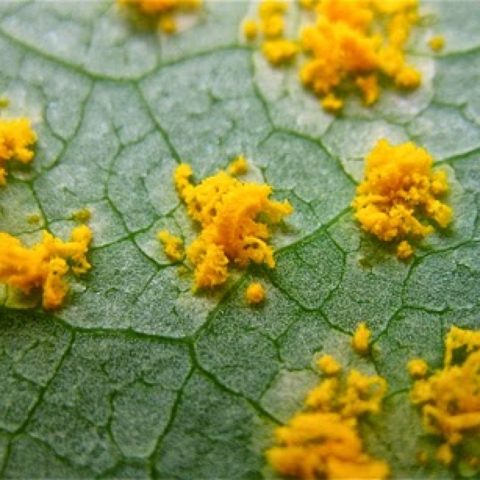
Excessive watering with cold water can cause rust and gray mold
Heliotrope Marine prefers mineral complex fertilizers, which have the most favorable effect on the duration and splendor of flowering. Top dressing is applied every 14-15 days after planting and until the first buds appear.
Weeding, loosening, mulching
Gardeners who rarely appear on their plots are advised to mulch the soil around the heliotrope with hay, wood shavings or sawdust. Such manipulation allows you to keep water in the ground for an extended period and eliminates the need for regular loosening and weeding of the flower bed. Mulching significantly reduces the risk of fungal infections and mold damage from Marin Heliotrope.
Topping
When the seedlings grow to 11-12 cm, the growth point of each is pinched. Thanks to this procedure, the heliotrope bushes of Marin will be more lush and richly blooming.
Wintering
In winter, the heliotrope tree-like Marin is dormant, it must be provided with temperature conditions from +5 to +8 ° C. Since the plant is thermophilic and prefers a subtropical climate, it is dug out of the open ground for wintering and planted in a pot, which should be kept indoors until spring.
Pests and diseases
For the heliotrope Marine, the danger is the whitefly, which has an external resemblance to a moth or a small butterfly. Plants affected by the whitefly become covered with cloudy yellowish spots, and the leaf plates curl and stop developing. For prevention, the room in which the flowers are located is regularly ventilated. In case of infection, use a soap solution or an insecticide (the treatment of Marin's heliotrope is carried out 2 times with an interval of a week).
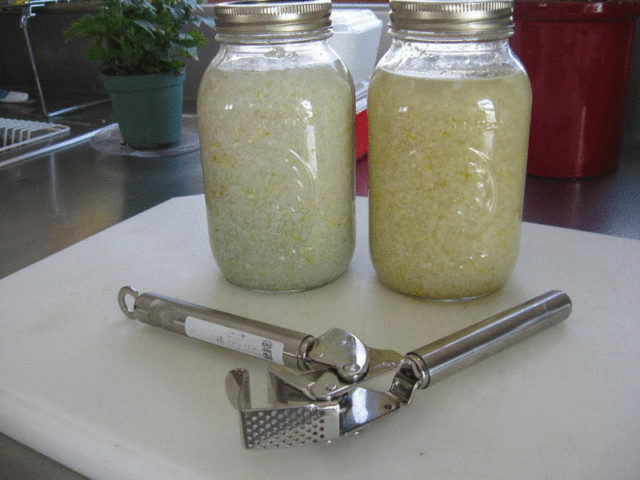
Proven folk remedies for whitefly - infusion of garlic or yarrow
It is much more difficult to get rid of the spider mite on the Marin heliotrope, since the pest is very small in size. The most suitable time to fight spider mites is autumn, when it acquires a noticeable orange color. Multi-colored spots (from yellow and red to silvery) are signs of culture infestation.
It is worth trimming leaves with traces of damage, which will stop the further spread of the tick.
Gray rot on the leaves can occur due to regular waterlogging or lack of sunlight. Sluggish leaves indicate insufficient moisture. If the tips of the leaves curl up, then the air is too dry. Light or yellowed leaves indicate insufficient light levels or excessively high temperatures.
Conclusion
Growing heliotrope Marin from seeds is possible subject to certain rules. This variety is distinguished not only by its decorative qualities and enchanting aroma, but also by its therapeutic properties. In folk medicine, the plant is used as an antihelminthic agent and a medicine for urolithiasis. Heliotrope is used to treat lichen, and warts are removed from it with drugs.
